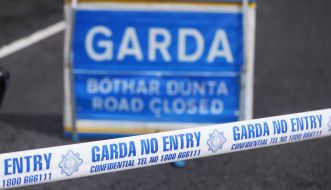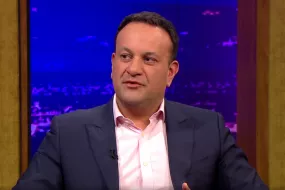A garda has described how she returned to a pensioner's home to find him dead in his driveway 14 minutes after she and her colleagues spoke to him about a neighbour with mental health issues who was chasing cats in his garden.
The Central Criminal Court also heard that Patrick McDonagh (52), who is on trial accused of murdering Peter McDonald (73), swung a machete at members of the Garda armed support unit, who forced entry to his home before he was tasered and restrained.
Garda Aine Doherty told Philipp Rahn SC, for the Director of Public Prosecutions, that she was the driver of a Garda van on mobile patrol when she received a call to go to Whitechapel Road, where an elderly man had indicated he was upset following a disagreement with his neighbour.
Gda Doherty and two colleagues arrived at 5.33am and Mr McDonald invited them into his home and told them that his neighbour had been in his garden chasing his cats.
He said he believed his neighbour had an issue with the cats and told gardaí that the neighbour told him to "get out of here", or words to that effect.
He said the neighbour appeared to have mental health problems and was on medication, the garda added.
Gda Doherty and her colleagues assured Mr McDonald that community policing officers would call him and left at 5.51am.
Six minutes later, they received a call telling them to urgently return to Whitechapel Road. They arrived at 6.05am and Gda Doherty saw Mr McDonald lying in his driveway face down surrounded by a large amount of blood.
He had a gash on his face and Gda Doherty said it was obvious that he had suffered fatal injuries.
'Gentleman'
Gda Doherty told defence counsel John Fitzgerald SC that after telling gardaí about the issue with his neighbour, Mr McDonald spoke about his life in general, and various social outings he had attended.
She got the impression Mr McDonald was lonely and wanted someone to talk to.
She described him as calm and said he did not appear to be in fear or show any signs of concern regarding what he had reported to gardaí about his neighbour's behaviour.
Patrick McDonagh, with an address at Whitechapel Road, Clonsilla, Dublin 15, is charged with murdering his next-door neighbour, Peter McDonald on Whitechapel Road on July 25th, 2020.
Mr McDonagh has pleaded not guilty to murder but guilty to manslaughter. The State has not accepted his plea.
The jury has heard that "gentleman" pensioner was found in a pool of blood outside his home after being violently attacked with a machete by his neighbour.
In his opening speech, Mr Rahn told the jury that the evidence will show that Mr McDonald died by machete and stab wounds to the head and neck in the early hours of July 25th, 2020.
Mr Rahn said he expected the main issue the jury will grapple with will be whether Mr McDonagh’s mental health on the night amounted to the "special defence of diminished responsibility".
Mr Rahn told the jury that Mr McDonald was a "quiet man, a pensioner, who kept to himself and lived with his cats", and that Mr McDonagh, who had a history of mental health issues, was his next-door neighbour for five or six years.
Deep laceration
Frank Black, of the Dublin Fire Brigade, told Mr Rahn that he arrived at the scene at about 6.05am and saw Mr McDonald face down in the driveway, surrounded by blood.
When he turned Mr McDonald over to get a better look, he noticed a "very deep laceration" running from under the left ear to the right side of his Adam's apple. There was also a lot of blood from a deep laceration to his left forearm, Mr Black said.
The injuries were "incompatible with life," he said, adding that the patient was not breathing, his heart was not beating, and there were no signs of life.
Mr Black said he and his colleagues decided not to attempt resuscitation.
Garda Brian Carroll, from the Garda armed support unit, told Mr Rahn that officers established that Mr McDonagh, who was named as the suspect at the time, was in his own house next door to where Mr McDonald lay dead.
The armed units, carrying various weapons including submachine guns, covered every possible entrance to the front, back and side of the house.
They attempted to make contact with Mr McDonagh while they waited for a negotiator to arrive, but did not want to enter the house because they hoped to resolve the situation peacefully, he said.
Emotionally distressed
Garda James Verner told Mr Rahn that, standing on a small stepladder, he was able to see Mr McDonagh through a break in the blinds of the kitchen window.
"He appeared to be in an emotionally distressed state, sweating profusely, crying, sitting in a chair and rocking back and forth," the witness said.
Gda Verner could see a religious icon on the kitchen wall, and Mr McDonagh "appeared to be praying, chanting, whispering and murmuring to that picture on the wall".
The garda said he could also see what he described as a large machete and a kitchen knife, and on several occasions Mr McDonagh picked those items up and walked around the room, "uttering things to the picture on the wall".
Gda Verner attempted to speak to Mr McDonagh but, he said, "he just turned his head away from me, he blanked me."
Later that morning, new members of the armed support unit relieved their colleagues. At 11.30am, the decision was taken to enter the house.
Garda Kenneth Clints told Mr Rahn that negotiations had broken down and there was a concern for Mr McDonagh's welfare.
Using a piece of hydraulic equipment, Gda Clints popped the lock on the front door and, as the door opened, he saw Mr McDonagh "swinging a yellow-handled machete through the gap in the door". A garda raised his shield and blocked the machete.
Gda Clints said he saw Mr McDonagh place the machete on a radiator near the door and retreat to his kitchen. Gardaí entered, removed the machete and tried again to engage with Mr McDonagh through his kitchen door.
Gda Clints said: "He was very agitated and aggressive, he didn't seem to be listening to anything we were saying to him. We told him to get on the ground, to show his hands, but he refused to comply."
Gda Clints said he became concerned for the welfare of gardaí in the narrow hallway, stating: "If he came at us with a knife, we had nowhere to go, so I deployed a less lethal weapon, the taser.
"It was effective, Mr McDonagh fell to the ground, we restrained him and placed him in handcuffs."
The trial continues in front of Mr Justice Michael MacGrath and a jury of nine men and three women.







